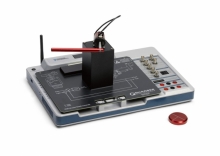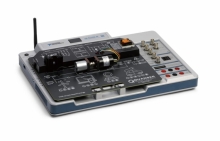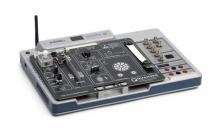Quanser Controls Board

Understanding the various types of actuators which are available, as well as the differences between them is key to making informed design decisions. Designed exclusively for the NI ELVIS III platform and LabVIEW™, the Quanser Mechatronic Actuators board exposes students to industry-grade measurement and command fundamentals for the four most common actuator types: brushed DC motors, brushless DC motors, stepper motors, and servo motors.
A mechatronic system must, by its very nature, interface between electronic and mechanical components. When an electronic system manipulates a mechanical component, an actuator is necessary. Due to cost and dynamic constraints, the vast majority of actuators used in mechatronics consist of some form of rotary drive connected to an armature. The Quanser Mechatronic Actuators Board provides hands-on experience controlling and measuring the performance of the four most common actuator types: brushed DC motors, brushless DC motors, stepper motors, and servo motors.
The following additional components are required to complete your workstation, and are sold separately:


The Quanser Energy Systems Board is intended to provide a safe, hands-on introduction to electrical power systems. The board uses scaled-down power systems to offer students a reasonable benchtop form factor. Designed exclusively for the NI ELVIS III platform and LabVIEW™, the board also exposes students to industry-grade instrumentation, measurement, and control fundamentals.

A critical component of any mechatronics course or program is an understanding of the theory and application of sensors used in mechatronic systems. The Quanser Mechatronic Sensors Board introduces students to various sensors that measure pressure, strain, temperature, contact, distance, angular displacement, and dynamics.
